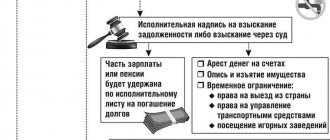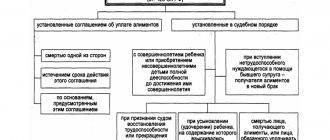What debts exist
By term of payment for services:
- current - the amount that was formed during the billing period, for example, from the 11th of the previous to the 10th of the current one;
- overdue - money that was not paid on time, for example, before the 10th, which affected the formation of debt from the 11th.
Until the end of the billing period, the debt does not affect anything, provided that the terms of the payment agreement are met. After the end of the payment period, failure to make a payment on time may lead to consequences specified by law.
By type of housing and communal services:
- heating;
- gas;
- electricity;
- water supply;
- garbage removal;
- Maintenance;
- repair and improvement of common property;
- major renovation.
How to find out debt through the terminal
You can also find out your debt using a payment terminal. There are quite a large number of them. You can check the debt in various ways depending on the type of terminal - by full name or personal account number.
You can also pay for services through the terminal. But before paying, carefully check the data, after payment you will be given a receipt with the data. The terminals have one drawback - the payment is credited within 5 working days, and if the payment does not go through by the 10th of the reporting month, penalties are charged.
How to check your housing and communal services debt
Find out debts for utilities at the address through:
- public services - GIS Housing and Communal Services, public services portal, where you need to register and log into your personal account, indicating your full name, tax identification number, address and other data;
- banks - the websites of Sberbank Online, VTB and other large banks contain sections with information about debts; information about the debt can be found in the banks themselves by showing the receipt;
- management companies - make a request to the servicing management company for the required types of utility payments by phone, in your personal account or in the office.
Find out the housing and communal services debt on your personal account. The data is indicated at the top of the payment document next to the payer's data. Information can be obtained at a bank or at a terminal, by phone or in person at the management company, in organizations supplying resources, settlement and information centers, through official service websites.
Check your debt through the mobile application. The Housing Standard ACS service helps residents promptly learn about debts, emergency shutdowns, participate in electronic voting of residents, and pay for services. Fill out the form with the management data and we will contact you with an offer to use the software.
To whom is debt information provided?
Information about debts for utility services can be clarified by any individual who has a personal account number for residential and non-residential real estate.
A personal account is a unique serial number assigned to a property. It is a place for accumulating housing and utility bills. If the property is sold, the owner transfers it to the new owner.
Providers of other types of utility services also provide housing with an individual number in the form of:
- personal account;
- payer code;
- subscriber number.
Reference!
When receiving separate receipts for utility bills, a separate bill for light or major repairs, the property owner can obtain information about the debt for each type of service using an individual number.
How to look at housing and communal services debt when buying an apartment
Who should pay? The debts of the previous owner for rent are not transferred to the buyer, except for debts for major repairs. Utility debts are assigned to the person, and not to the housing. However, they are an obstacle to obtaining a mortgage loan and cloud the purchase of a home.
How to find out about debts yourself. This can be done on the bailiffs website. Provide personal information and find enforcement proceedings for the debts of the previous owner, if any.
What to ask the owner. You can check the utility debt using the owner’s receipts, if he agrees to show them. To protect yourself, after making a deposit, ask the seller to provide a certificate of no debt on utility bills. It is issued by the accounting department of the management company or EIRC.
What data will be needed:
- the period during which the debt was incurred;
- the region in which the debtor lives;
- list of housing and communal services;
- in what ownership is the housing: shared, individual or full;
- how many people live at the specified address.
Initiation of legal proceedings
In some cases, the retention of utility debts occurs through the intervention of judicial authorities. There is such a term as the cost of a claim, which means the material expression of property claims that come from the plaintiff in court. When collecting a debt from an individual who is a utility debtor, the cost of the claim may be slightly increased. Services such as homeowners' associations or management offices have the right to independently participate in legal proceedings, as well as to involve special agents in these processes.
This is important to know: Debt collection for housing and communal services: statute of limitations by law, recalculation
In accordance with the rules of the current legislation, you can apply to the court with a request to help withhold utility bills that have accumulated for a certain individual in the following situations:
- If a contract is concluded between the consumer and the supplier. If an individual who is a user of communal resources has drawn up an agreement for their provision directly with a legal entity acting as a management organization, then if funds are not paid, legal proceedings may be initiated. This is explained by the fact that the consumer who signed the contract automatically became obligated to pay for utilities and is liable in case of violations on his part.
In 2021, the consequences facing a utility debtor have become somewhat more severe. Now, after submitting an application to the court, the management service will receive a response within five days regarding whether the debt will be withheld. The debtor can challenge this decision within ten days. This can be done by completing and submitting an application containing information that the debt was accrued in violation of current legislation. If the judge receives a statement of this kind, the decision will be annulled. If a repeated claim is received by the management office, a court hearing will be held, at which both parties must be present.
How to find out the debts of relatives on utility bills
How to find out the debt for housing and communal services through government services. You can check your housing and communal services debt at your address via the Internet. Register on the official government services portal by entering your relative’s details and you will be able to get the necessary information at any time of the day. You can also check the housing and communal services debt of a sick relative at a management company.
Who should pay the debt? If the residential premises are owned, then the obligation to repay the debt falls on the capable family members who are registered there. After the death of a relative, heirs to residential premises also inherit his debts for housing and communal services. It is necessary to pay for the last 3 years in accordance with paragraph 1 of Art. 196 of the Civil Code of the Russian Federation.
How to get rid of rent debts
An opportunity to reduce the debt is to prove that the tenants were absent for five or more days. Such recalculation is made for services for which individual control devices are not installed. It is possible to achieve recalculation for gas in the absence of a meter only if there is a certificate stating the technical impossibility of installing it.
Debt write-off is not provided for by law. Utility debts accumulate, are collected in court, or continue to be registered with the apartment as hopeless. But during legal transactions with housing - registration of a subsidy, purchase and sale, donation - they will have to be paid. In the event of the owner's death, the debt will pass to the heir of the apartment. Business entities have the right to write off debts under Article 415 of the Civil Code of the Russian Federation, but this is not their responsibility and is not applied in practice.
According to Article 196 of the Code of Civil Procedure of the Russian Federation, the statute of limitations for cases of debt collection is 3 years. But this does not mean that the debtor cannot be sued or that after the meeting the debts will be written off. In order for the court to take this fact into account, the defendant must file a petition on time and the debt cannot be collected within the framework of enforcement proceedings by court decision. It should be taken into account that the limitation period may be interrupted and the debtor will not know about it. The calculation begins anew from each fact that can be regarded as an acknowledgment of debt:
- the subscriber has repaid part of the debt - any payment is the fulfillment of obligations under the contract and recognition of the legitimacy of the claims of the other party;
- signature under a document confirming the existence of a debt - if the debtor signs on any receipt or notice that states that he has a debt, then this is considered an agreement with it and cancels the countdown.
This is important to know: How often can you change your housing and communal services management company?
How to find out debt for housing and communal services on behalf of the company
Who is allowed to find out about the debts of the owners. According to Federal Law No. 152-FZ of July 27, 2006 “On Personal Data,” information about debts without the knowledge of the debtor can only be obtained by certain government bodies, management companies of investment funds, mutual funds and non-state pension funds, credit organizations, mortgage agents and collection companies included in the state registry.
How to find out the debt for housing and communal services. Legal entities that are legally allowed to find out debts without the participation of homeowners can do this using the payer code online. The code consists of 10 digits and is printed on the receipt next to the address. The procedure for obtaining information is the same as in all other cases after registering on the service portal and logging into your personal account.
If there is no payment document or there are doubts about its authenticity, you can find out the invoice at the information and settlement center. Provide the address of the apartment and an employee of the institution will tell you the payer code.
How to quickly find out a debt and collect it. A management company or homeowners association can use an automated system for working with debtors to collect receivables. It allows you to quickly receive information about debts, generate the necessary documents, control claims, and automatically inform owners about the amount of debt.
To access the system, contact us by phone or online and we will tell you in detail about its benefits.
Ways to obtain information about debt
Information about the debt is contained in a single payment document (UPD) or a receipt for payment of utilities.
The following will help you find out your housing and communal services debt:
- FULL NAME. To obtain data, only the last name will not be enough; the room number is also required. To find out information, you need to call the management company or visit the institutions in person. Employees ask for the housing number and, for a faster search, the owner’s last name.
- Address. By contacting the management company or the cash desk of the housing and communal services provider, you can obtain information about the utility debt of interest at the address. It is advisable to have your passport with you.
There are several ways to obtain information:
- Through the Internet.
- At a branch of a banking institution.
- In the management company.
- At the post office.
Through the Internet
You can get information about utility debt using:
- The website of the management company or the portals of various housing and communal services providers. The first step is to register and authorize on the portal of the management company or utility service provider. In most cases, the debt is displayed in the “Payments” or “Payment” categories.
- “Personal account” of “Government services”. To receive the amount of debt for housing and communal services in your personal State Services account, you must fill out an application for payment contribution. Decide on a service provider, and then fill out a special form. Information about the underpayment will appear on the screen.
- Special service "GIS Housing and Communal Services". This application can be used by individuals who have registered on the State Services website. Connect your personal account to your account and provide the required information in a special form. Utility service providers are required to enter data into the Housing and Communal Services GIS.
- In banks' own applications.
Attention!
Residents of Moscow can find out the amount of debt in the Yandex.Money service or on the portal of the mayor of the capital by requesting an EPD. In both situations, a personal account or payer code will be required. There is a special Citycard project for residents of the regions.
At a bank branch
When visiting a bank branch, you can use an ATM or contact a cash service operator.
To obtain information through an ATM, you will need the details from the receipt. Terminals of different banks differ in commission percentage, otherwise the actions are similar:
- select the type of housing and communal services;
- indicate your personal account number;
- select a month;
- The amount of debt is displayed on the screen.
Attention!
Payment can be made in cash or by credit card. When replenishing your personal account with cash, keep in mind that ATMs do not return change.
Supporters of conservative payment methods can find out the amount of the current debt through the bank cash desk. The operator needs to provide a receipt for the last month, on the basis of which the status of the utility debt will be established.
In the management company
The telephone number of the management company is indicated on utility receipts, and can also be found when searching for a company on the Internet. To clarify the debt, you will need a personal account, address and surname of the owner. In case of debt for several types of utilities, you must contact each supplier.
Important!
From time to time, the management company posts information about non-payers on the notice board at each entrance or at the elevator.
At the post office
You can also find out about utility debt by contacting the post office. In this case, you will need the subscriber account number and owner's address. To resolve the issue this way, you need to be patient, since post offices are constantly filled with people. The process is similar to clarifying data through a bank cash desk, but the commission if you decide to pay the debt will be higher.
Why is it worth using the Housing Standard automated control system for debt control?
- The program reflects accurate information about all residents who are members of the management company or HOA. Thanks to the user-friendly interface, it is easy to download and control information.
- All software we offer integrates with each other. Thanks to mobile applications, data on payments, debts, and subsidies are always freely available for residents; for employees, there is a convenient service for calculating payments, penalties, and generating documents.
- The functionality of the debt collection module allows you to control tenants’ debts, lawsuits, and evaluate the results of work, which increases the collection of payments.
Using the program for the first 3 months is free. The cost of further use is calculated individually. Call or fill out an application on the website and we will select a software package for your purposes.
- 05.06.2019
Where can you find out your debt to housing and communal services?
Apartment owners pay monthly for the services provided to them by utility organizations. When debt arises, debts accumulate. Once it becomes possible to pay your obligations, another problem arises - how and where to find out the exact amount of the debt? The resident has several options for this:
- Housing and communal services
. Visiting a housing office is the most proven method. The downside of this procedure is the huge queues. - Websites of utility organizations
. Information technologies allow any citizen not only to find out his debt, but to make a money transfer. - Internet services
. In every region of Russia, there are one or more online payment systems through which you can not only find out your current debt, but also enter meter readings, as well as pay off the debt. - Telephone .
To receive data, the operator must provide an address or personal account. - ATM
. By logging into the system and using the necessary options, you can find out the debt and pay the debt immediately.
We would like to draw attention to the fact that not all online services promptly update their data
. Incorrect information may mislead the payer. Below we look at proven services.
Websites of fuel and energy enterprises
Now any organization providing utility services has an online service with which you can:
- Read current regulatory documents related to the public utilities sector.
- Stay informed about the latest changes in charging tariffs for services.
- Find out about your debt to housing and communal services.
- Pay for the services of housing and communal services and fuel and energy companies.
Let's name some online services:
- The service https://www.is.mos.ru/ can be used by residents of Moscow and the Moscow region. The service began to operate fully in 2011.
- For St. Petersburg there is a website www.kvartplata.info. Starting from December 2014, every citizen can log into his personal account and find out all the information he is interested in.
Similar services exist in Nizhny Novgorod, Yekaterinburg, Kazan and many other large cities of Russia. What a resident should do is find out the website address, register and take advantage of modern innovations.
Large apartment debt: how to get rid of it
Of course, it will not be possible to completely avoid paying utility debts. However, let's consider a couple of points that will help significantly facilitate this process.
To begin with, we recommend that you remember such a concept as the statute of limitations for rent bills, which by law is no more than 3 years. That is why all of them are marked “store for 3 years”. If the management company sues you to pay debts that are more than three years old, you need to respond by filing a claim that the utility company has missed the statute of limitations, as a result of which the amount of the debt may be reduced. However, be careful - if you do not submit such an application, then no one will remember the statute of limitations for you.
Another popular way to resolve a debt problem is debt restructuring. This is an agreement between the debtor and the company providing utility services, which is concluded for a certain period of time and obliges the owner of the apartment to pay the debt in installments, plus, if even a minimum amount is paid, the supply of utility services is resumed very quickly. We do not advise you to miss the opportunity to conclude a restructuring agreement, because such issues are much more difficult to resolve through the court. Moreover, management companies are very willing to meet defaulters halfway in signing a restructuring agreement, since they also do not need legal delays.
Of course, a situation where there is no money at all can happen to anyone, but in order to prevent problems with the law from arising, it is better to find out in time about the existence of debts and try to pay them off as quickly as possible.
Dear readers!
It's fast and free!
Or call us by phone (24/7).
Every year utility tariffs increase. 2021 was no exception for citizens of the Russian Federation. At the beginning of last year, a new law was adopted to tighten liability for debtors in payment for housing and communal services. What the new law implies and what punishment is provided for willful defaulters, we will consider further in the article.








